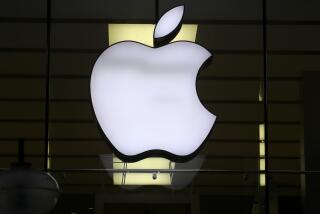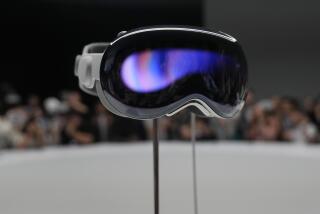Hype over iPhone hangs over Apple
SAN FRANCISCO — Not even an appearance from hype-master Steve Jobs could satisfy the craving Apple Inc. has created. Tech enthusiasts made clear Monday that they won’t be happy until Apple starts selling the iPhone.
Eighteen days before the much-anticipated mobile device hits store shelves, software developers and Apple fans crowded a conference center in San Francisco to see Apple’s chief executive unveil features of another product: the upcoming Leopard operating system for Mac computers.
But by far their loudest cheers were reserved for images of the iPhone that occasionally flashed on the giant screen behind Jobs. Software developers were already talking about their plans to camp outside of stores in hopes of scoring one when it goes on sale at 6 p.m. June 29.
“How much is in here that you can’t use?” John Stevens, director of engineering at Santa Monica-based EncoreHollywood, said of his Motorola phone. “Apple will do it better.”
Yet Apple is struggling to keep expectations in check as it prepares to release one of the most hotly anticipated new technology products. Its stock has risen 42% this year, largely on hopes that the iPhone will join the Mac and iPod as huge businesses for the scrappy computer maker.
Attendees of the Apple Worldwide Developers Conference said they were disappointed that Jobs didn’t reveal more about the device or their role in making software to run on it.
Investors also appeared to be expecting more from Jobs’ keynote speech. They sent Apple’s shares down 3.5% to $120.19 despite news that Apple was negotiating with movie studios to create a video-on-demand service through its iTunes store. A movie studio executive confirmed Monday that talks were underway for an online rental service that would charge $3.99 for new releases and $2.99 for older titles.
Announced in January, the iPhone combines a mobile phone, a digital media player and an Internet device into a sleek package with a novel touch screen. It will cost $499 to $599 and operate on AT&T; Inc.’s cellular network.
“This is an opportunity for [Apple] to find a big growth business so they can move the needle in the whole industry by their presence,” said Stephen Baker, a vice president at market research firm NPD Group.
Apple aims to capture 1% of the cellphone market by 2008, selling 10 million iPhones. But it’s entering a smart-phone market that’s already crowded with tough competitors including Nokia, Sony Ericsson, Research in Motion Ltd.’s BlackBerry and Palm Inc.’s Treo.
And the iPod’s success obscures the fact that Apple products have fizzled before, including the Newton hand-held device and the Cube desktop computer.
“It’s a fairly big gamble for Apple, in particular for its credibility,” said John Spooner, a senior analyst at Technology Business Research in Hampton, N.H.
Jesse Drew, director of technoculture studies at UC Davis, said the iPhone was becoming a symbol of how fashionable computers have become -- even before it’s for sale.
“What people want is a magic wand, an object in my hand that does everything,” he said.
But in San Francisco, the developers were concerned that the device would be too big and difficult to use and would suffer from poor battery life.
“You have to be able to make a phone call,” said Mike McGuire, an analyst at Gartner Inc. “If you don’t do that, it’s an expensive iPod.”
Jobs had other Apple businesses to discuss Monday, including the newest Mac OS X operating system, known as Leopard. The operating system, key to the company’s computer business, won’t be available until October because Apple said in April that it needed its engineers to focus on finishing the iPhone.
With Leopard, a user will be able to flip through documents and applications much like flipping through vinyl albums. A feature called the Time Machine lets users easily find missing documents and files.
Jobs also announced that Apple had made its Safari browser available on computers running Microsoft Corp.’s Windows operating system.
And he did clear up one thing that developers had wondered about the iPhone: Would they be able to write software for it as they can for the Mac, or would it be closed to outside programs as the iPod is?
The answer was somewhere in between. Jobs said they could write and sell programs that run on the iPhone’s Web browser but not programs that users can install as one of the coveted icons on the iPhone’s home screen.
“There was a buildup,” Stevens said, “but the payoff wasn’t huge.”
Times staff writer Dawn C. Chmielewski contributed to this report.






